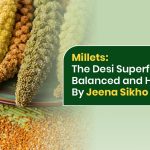As people age or adopt unhealthy lifestyle choices, joint pain is one of the most prevalent discomforts they encounter. Pain in the knees, shoulders, or back, whether from arthritis, trauma, or inflammation, can significantly impair day-to-day activities and mental health. The good news is that Ayurvedic treatment for joint pain offers its patients a comprehensive strategy that treats the underlying cause of the pain in addition to reducing its symptoms.
While modern medicine only addresses the symptoms, Ayurveda offers a lasting solution through herbs, therapies, and even lifestyle modifications. Special natural remedies, such as herbs and treatments, have been developed by Jeena Sikho, one of the most well-known Ayurvedic wellness brands, to heal the joints.
In their practice, they have combined the benefit of traditional knowledge with practical application to provide permanent joint pain relief through Ayurveda. Now, we will learn how Ayurveda can treat joint pain and why the Jeena Sikho strategy is effective.
Ayurveda: A Natural Way to Relieve Joint Pain
When we speak of , we’re referring to more than just pain management. Ayurveda identifies the imbalance in Vata dosha (air and space element) as the primary reason behind joint degeneration, swelling, and stiffness. The Ayurvedic approach includes herbal supplements, detox therapies like Panchakarma for joint pain, oil massages, and a Vata-pacifying diet that brings lasting relief without side effects.
Jeena Sikho uses the traditional treatment in a modern way to provide personalized health solutions besides relieving symptoms.
Understanding Joint Disorders: Types, Causes & Symptoms
According to Ayurveda, joint pain is mainly classified under Vata Vyadhi, or diseases brought on by an imbalance in Vata. When Ama (undigested toxins) accumulates in the joints due to poor digestion and low immunity, it disrupts the flow of prana (life energy) and causes inflammation, stiffness, and discomfort.
Common Joint Conditions:
-
Osteoarthritis (Sandhivata): Degeneration of cartilage due to ageing or wear and tear. Characterised by grinding pain, stiffness, and joint noise.
-
Rheumatoid Arthritis (Amavata): An autoimmune disorder where Ama blocks Vata movement, causing painful swelling and stiffness in multiple joints.
-
Frozen Shoulder, Gout, Ankylosing Spondylitis: This also results from Vata-Kapha imbalances or uric acid buildup.
Key Symptoms:
- Rigidity and immobility
- Joint redness, irritation or swelling
- Tiredness or weakness
- Sound during movement: Crackling
- Injury to the affected joints.
These symptoms may be mild initially, but if not treated early on, they can cause deformity and chronic pain.
Ayurvedic Treatments for Joint Pain
Ayurvedic treatment for joint pain follows the most effective process for joint pain in HiiMS, Jeena Sikho
1️. Herbal Remedies – Best Ayurveda Herbs for Joint Pain
Jeena Sikho uses natural herbs that follow traditional wisdom.
-
Shallaki (Boswellia): Decreases swelling and repairs cartilage.
-
Ashwagandha: Enhances strength and endurance while lowering oxidative stress.
-
Guggul: Maintains clean and healthy joints.
-
A traditional anti-inflammatory concoction of ten roots is called dashmool.
-
Turmeric (Curcumin): Inhibits inflammation enzymes and cleans the blood
These are used in various forms, like tablets, decoctions, oils, or churnas, to provide the best Ayurveda remedy for joint pain.
2️. Therapies: Panchakarma & other therapies for Joint Pain
The most Ayurvedic detoxification therapy, Panchakarma for joint pain, includes the following Ayurvedic karmas:
- Vamana: Releases toxins from the upper body.
- Virechana (Purgation): Cleansing the liver and the intestines.
- Basti (Medicated Enema): This is the best treatment for the pain in joints and spine, caused mainly by an imbalance of Vata
- Nasya (Nasal Cleansing): Cleans and removes toxins in the head and neck area
- Raktamokshana (Bloodletting): Purifies the impure blood, mainly in swollen joints.
Other supportive therapies include:
-
Abhyanga
-
Swedana
-
Pinda Sweda
-
Janu Basti
-
Kati Basti
These therapies deeply nourish the joints, increase mobility, and eliminate toxins, offering long-term joint pain relief through Ayurveda.
Lifestyle & Dietary Recommendations
Food is medicine according to Ayurveda. Joint health depends on a diet that prevents the formation of Ama, enhances digestion (Agni), and balances Vata.
Lifestyle Tips from Jeena Sikho:
- Consume food that is warm, moist, and grounding: Soups, herbs like hing and cumin
- Ama is caused by cold, fermented, and processed foods.
- To increase mobility, practice yoga and stretches frequently (Trikonasana and Vrikshasana).
- Daily Abhyanga (self-massage) using warm sesame oil.
- Maintain regular sleep and reduce mental stress through meditation and pranayama.
Conclusion
Taking an Ayurvedic treatment for joint pain does not indicate that you are searching for a quick fix; instead, you will receive long-term overall body health. Jeena Sikho utilises a time-tested natural solution to address the root causes of imbalances in the dosha and toxin accumulation, thereby assisting the body in cleansing and detoxifying. The proper Panchakarma therapies, allied herbal formulations, and an aiding lifestyle make you walk again without pain. Maybe you are a victim of overlong suffering relating to joint pain; it is high time you turned to nature to bring healing to you.
Take the first step towards a pain-free life with Jeena Sikho’s Ayurvedic care. Book your consultation today and experience real healing through Ayurveda.
FAQs
Q1. Are elderly or arthritic people safe to use Panchakarma?
Seniors can benefit from panchakarma for joint pain if they receive the right supervision and gentle, individualised treatment.
Q2. Which Ayurvedic remedy is the most effective for joint pain?
Natural herbs like guggul, shalaki, and medicated oil, along with detoxification, are the best Ayurvedic remedy for joint pain.
Q3. In what ways does Ayurveda help joint pain?
The process through which Ayurveda relieves joint pain is detoxification of the body and lowering the level of vata dosha imbalance.
Q4. What lifestyle changes best support the Ayurvedic treatment of joint pain?
The best Ayurvedic remedies for joint pain include avoiding cold temperatures, getting warm oil massages, maintaining an active lifestyle, and eating a diet that balances vata.
Q5. Can Ayurveda be used to treat chronic joint pain?
Ayurveda’s root-level remedy helps treat chronic joint pain without prescription medications.







